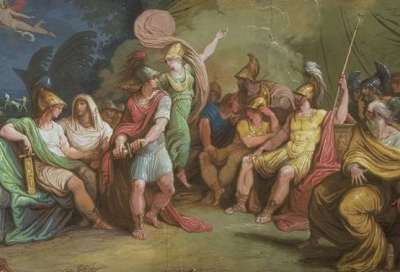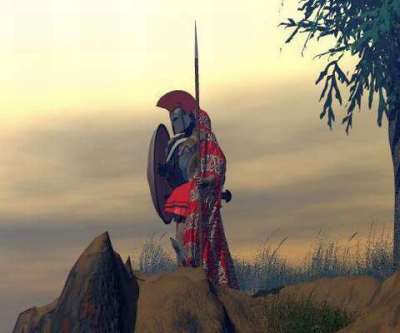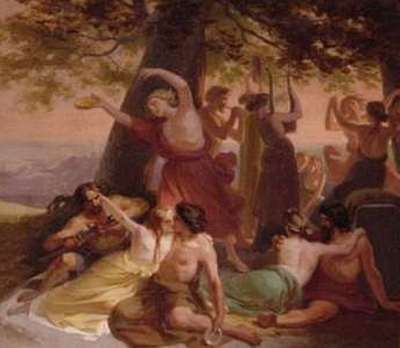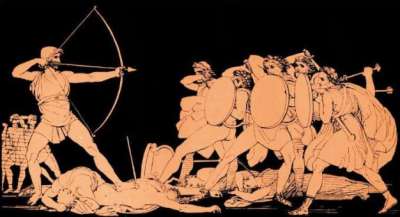
The precise contextualisation of the Homeric poems is still to a certain extent inconclusive: many scholars have pursued this undertaking yet reaching rather hesitant results. The Mycenaean epoch, even though widely recognised as the social framework within which the splendid Homeric narrative masterly develops, seems to correspond only partially to the scenario where the highly celebrated heroes dwell. From the political standpoint, however, it can be almost confidently affirmed that the Homeric heroes’ functions and their institutions appear less sophisticated and bureaucratic than those we can infer from the archaeological findings related to the Mycenaean world. Actually, in spite of the detailed descriptions of warfare tools, strategies and attires which almost comply with civilisation of Mycenae, several social, political and religious beliefs, behaviours and rituals must be considered somewhat modern and definitely more recent.
For instance the Basileus represented into both poems is deemed only partly as the reproduction of the Mycenaean king; for he can also be considered the chief of any of those communities who survived the decay of that evolute pre-Greek culture. His government his principally based on recognised power and strength rather than acclaimed wisdom and proved judgement. As Hector sustains talking about his son to his wife Andromache:
But he kissed his dear son, and fondled him in his arms, and spoke in prayer to Zeus and the other gods: “Zeus and ye other gods, grant that this my child may likewise prove, even as I, pre-eminent amid the Trojans, and as valiant in might, and that he rule mightily over Ilios. And some day may some man say of him as he cometh back from war, ‘He is better far than his father’; and may he bear the blood-stained spoils of the foeman he hath slain, and may his mother’s heart wax glad.
And as hopeless Telemachus laments before the Ithacan assembly enduring the long lasting siege perpetrated by Penelope’s suers:
For there is no man here, such as Odysseus was, to ward off ruin from the house. As for me, I am no-wise such as he to ward it off. Nay verily, even if I try I shall be found a weakling and one knowing naught of valour. Yet truly I would defend myself, if I had but the power
And as proudly Nausicaa claims the praises of her father king Alcinous when she meets Ulysses for the first time:
The Phaeacians possess this city and land, and I am the daughter of great-hearted Alcinous, upon whom depend the might and power of the Phaeacians.
The Homeric Basileus, similarly to the Mycenaean wanax, besides exercising his ruling functions is primarily in charge of the army and derives his powers directly from the Gods, as Odysseus points out to the assembly of the generals:
In no wise shall we Achaeans all be kings here. No good thing is a multitude of lords; let there be one lord, one king, to whom the son of crooked-counselling Cronos hath vouchsafed the sceptre and judgments, that he may take counsel for his people.
The same creed is corroborated by Nestor when he speaks before a restricted counsel held in Agamemnon’s (commander in chief of the Achaean forces) tent:
He with good intent addressed their gathering and spoke among them: “Most glorious son of Atreus, Agamemnon, king of men, with thee will I begin and with thee make an end, for that thou art king over many hosts, and to thee Zeus hath vouchsafed the sceptre and judgements, that thou mayest take counsel for thy people. Therefore it beseemeth thee above all others both to speak and to hearken, and to fulfil also for another whatsoever his heart may bid him speak for our profit; for on thee will depend whatsoever any man may begin.
What particularly strikes is the greatly confounding contrast between the description of Alcinous’ kingdom and residence – which strongly reminds of a typical palatial socio-political structure – and Ulysses’ realm:
Odysseus went to the glorious palace of Alcinous. There he stood, and his heart pondered much before he reached the threshold of bronze; for there was a gleam as of sun or moon over the high-roofed house of great-hearted Alcinous. Of bronze were the walls that stretched this way and that from the threshold to the innermost chamber, and around was a cornice of cyanus. Golden were the doors that shut in the well-built house, and doorposts of silver were set in a threshold of bronze. Of silver was the lintel above, and of gold the handle. On either side of the door there stood gold and silver dogs, which Hephaestus had fashioned with cunning skill to guard the palace of great-hearted Alcinous; immortal were they and ageless all their days. Within, seats were fixed along the wall on either hand, from the threshold to the innermost chamber, and on them were thrown robes of soft fabric, cunningly woven, the handiwork of women. On these the leaders of the Phaeacians were wont to sit drinking and eating, for they had unfailing store. And golden youths stood on well-built pedestals, holding lighted torches in their hands to give light by night to the banqueters in the hall. And fifty slave-women he had in the house, of whom some grind the yellow grain on the millstone, and others weave webs, or, as they sit, twirl the yarn, like unto the leaves of a tall poplar tree; and from the closely-woven linen the soft olive oil drips down. For as the Phaeacian men are skilled above all others in speeding a swift ship upon the sea, so are the women cunning workers at the loom, for Athena has given to them above all others skill in fair handiwork, and an understanding heart. But without the courtyard, hard by the door, is a great orchard of four acres, and a hedge runs about it on either side. Therein grow trees, tall and luxuriant, pears and pomegranates and apple-trees with their bright fruit, and sweet figs, and luxuriant olives. Of these the fruit perishes not nor fails in winter or in summer, but lasts throughout the year; and ever does the west wind, as it blows, quicken to life some fruits, and ripen others; pear upon pear waxes ripe, apple upon apple, cluster upon cluster, and fig upon fig. There, too, is his fruitful vineyard planted, one part of which, a warm spot on level ground, is being dried in the sun, while other grapes men are gathering, and others, too, they are treading; but in front are unripe grapes that are shedding the blossom, and others that are turning purple. There again, by the last row of the vines, grow trim garden beds of every sort, blooming the year through, and therein are two springs, one of which sends its water throughout all the garden, while the other, over against it, flows beneath the threshold of the court toward the high house; from this the townsfolk drew their water. Such were the glorious gifts of the gods in the palace of Alcinous. There the much-enduring goodly Odysseus stood and gazed. But when he had marvelled in his heart at all things, he passed quickly over the threshold into the house.
Especially when compared Odysseus’ domains and patrimony, which albeit devotedly praised by his servant Eumaeus – who considers his masters’ possessions boundlessly abundant – seem quite distant from requiring and actually having a Minoan and/or Mycenaean palatial organisation and bureaucracy:
Verily his substance was great past telling, so much has no lord either on the dark mainland or in Ithaca itself; nay, not twenty men together have wealth so great. Lord, I will tell thee the tale thereof; twelve herds has he on the mainland; as many flocks of sheep; as many droves of swine; as many packed herds of goats do herdsmen, both foreigners and of his own people, pasture. And here too graze roving herds of goats on the borders of the island, eleven in all, and over them trusty men keep watch.
Ultimately it seems that the Homeric society is rather a melange of different stages of proto-Greek and pre-classic Greek world, starting from the Mycenaean era to the more recent period were the poems are believed to have been composed: thus embracing at least three-four centuries of slow evolution/involution – as this period includes what is commonly defined the Greek Dark Age. These mixed traditions and their scenery concoction, most likely due to the sedimentary oral composition of the poems, narratively blend elements and situations that historically could have never concomitantly existed, perhaps poetically enhanced by Homer’s frequent romantic glances to the good old mythical and Mycenaean days.


